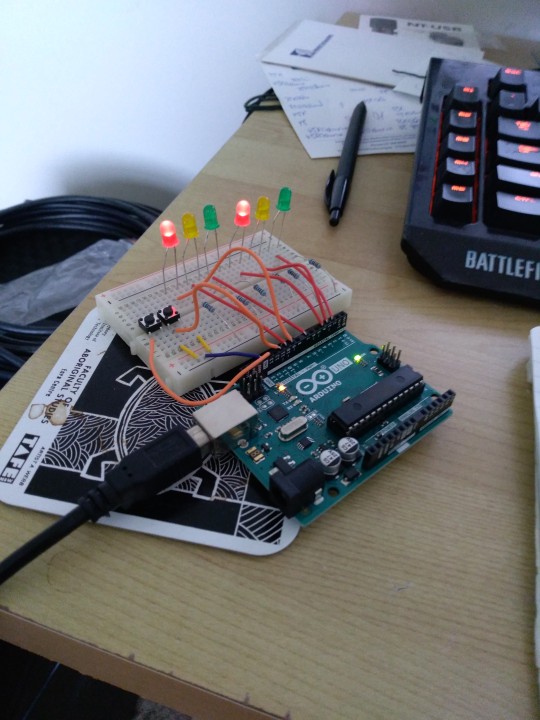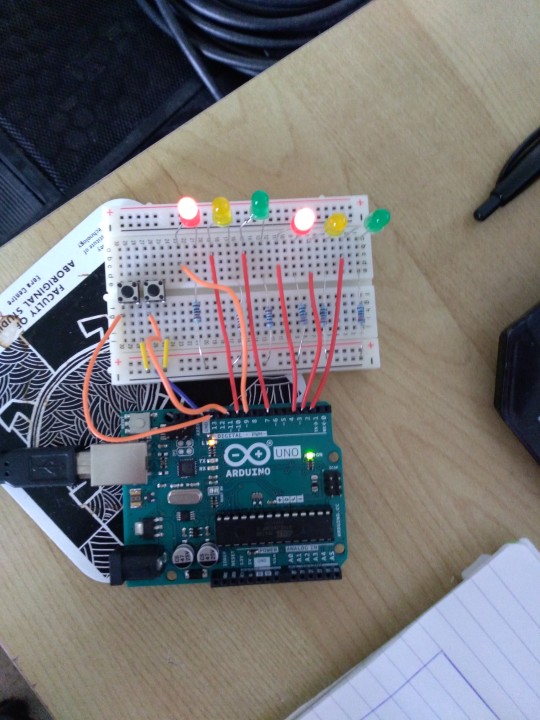Text
Making progress in any area requires taking risks. To learn where the boundaries are you have to push yourself further and further till you slam into it. My highschool experience through IB hammered into my head that I needed to always be making progress and building upwards and outwards. So much so that the term “growth mindset” had become so obvious to me that I never even considered mentioning it in any essay or blog post.
As I talk and learn from fellow students here I realize how absurdly different my education has been from others. And the more I understand the education system that most kids have been through the more I appreciate the absolute nightmare that was IB for me. I’d like to say coming out of the end of it that it broke me down and rebuilt me into a pioneering machine. In almost every aspect of my life I’m pressing and pushing against the walls around me to see how much space I can make for myself.
A problem I see with ICT is that while these lessons of telling us to push boundaries like this is that in my experience the most important growth happened after some of the worst times in my life. The sheer pressure of what I was asked to do cracked and fissured through the barriers I’d put in the way of genuine personal progress. I just don’t see that pressure being asserted in ICT. I remember a self-improvement book I read a while ago looked at how we say that bad habits DIE. Death is a very aggressive term that I never really took notice of, but understanding what I’ve been through and how I improved I completely understand why the word DIE is used. When significant change needs to be made in your life it has to be built up and overthrow your current way of being. The current way you approach things has to be slaughtered, and that results in an absolute blitz of thoughts and feelings. I believe that it’s a way your brain is coping with the loss of high traffic neural connections breaking. Resulting in signals that usually go through just fine having to divert through places that are rarely put to use. Change feels HORRIBLE in the moment. Especially the good kind.
For people to truly start to push boundaries and leave their comfort zones a death of the high school habits needs to happen. I just don’t see how that’s going to happen for people with the sheer amount of freedom in this course. Time will tell if people will go through that process, but I fear that I and the people around me aren’t being put in the best situation for improvement in this course.
The danger of the discomfort zone
in class today Ricardo was encouraging us to move out of our comfort zone and into the stretch zone or the discomfort zone. While its a idea I agree with I think he didn’t address the reason why the comfort zone is so appealing. Many of us have left high school being told how to write, learn and act to get good marks.
Why it sucks that marks inform how we act it would be foolish to say it doesn’t. I know i choose this degree because it diverts from the normal uni structure but it still is a uni degree so marks still have to be allotted. I know my first reaction to seeing a visual reflective essay was to ignore the visual reflective and just see it as a essay.
For me, years of conditioning about passing or failing has left me with a 2 circle system. I’m either comfortable or im panicking, and usually im both. When relaxing I have some background panic about not doing enough or worrying about life. When im working my monkey brain constantly tries to pull me away back to my comfort zone because its ‘safe’.
This might be an extreme example but it does address some of my thoughts on simply saying leave your comfort zone to those who have been punished for leaving it.
4 notes
·
View notes
Text
ICT Thoughts Follow-up
Just to make sure I’ve covered every base there actually is some points to be made with the creative reasoning stuff as well as some more general notes I’ve remembered, as well as some stuff I’ve remembered that actually applies really well here.
A super interesting concept I remember from Psychology/Sociology/Philosophy is the wisdom of the crowd. It’s the idea that when a middle ground of people’s opinions is found it tends to be the closest to the truth. The most common way it’s proven is by showing a large jar full of sweets and people are told to guess how many there are in the jar. Individuals tend to be all over the place and very inaccurate, but when their answers are averaged the answer is surprisingly close to the actual true answer of how many there are in the jar. And as more people’s opinions are gathered and are put into that average the accuracy increases.
This I think can be linked pretty strongly with the “needs” of good creative reasoning. People approach problems in unique ways, applying their own balances of each type of reasoning listed and tend to have preference and skill favouring one over the others. So by having a group of receptive and precise people to bounce an idea off of will result in the wisdom of the crowd averaging that idea out to something significantly more effective than it would’ve been otherwise.
As I said in the previous post our group has a surprisingly good balance in approaches and thought processes, as a result I’m confident that our iterative process with our Studio project will be a huge success.
Also I’ve really been impressed with Ricardo’s ability to process people’s unfiltered seemingly worthless babble into something worth listening to and applicable to all of us. That’s a super useful skill that I hope I pick up on as the course continues.
4 notes
·
View notes
Text
ICT Thoughts
The latest session we’ve had for ICT was a super interesting one. Not just in the sense I actually paid attention but also in that almost everything we covered seemed so familiar to me.
The concepts that we looked at were things I’d never actually heard of before, But when their details were explained I was shocked to discover these were essentially paraphrased versions of principles I’d learned in high school and during my gap year as methods for success.
The 5 Principles of Effectual Logic especially caught my attention. Through my time playing video games at a professional level I quickly learned the “Lemonade” principle as being active, vigilant and adaptable were the key improvements I needed to make to reach the top level.
I’m essentially just gonna write a huge catch-up on some points in my life that are pretty heavily linked with the principles of effectual logic just to nail these points in my head. If anyone reads this monster I hope you get something out of it.
In my last couple years of high school I went through the IB DP, which is one of the toughest school systems in the world. They just throw too much at you for a person who is highly unorganized like me to deal with. As a result I inevitably got overwhelmed and started to sink into a pretty heavy depression. While that sucked and I didn’t get much done I wasn’t just sliding right down the spiral of depression going nowhere. While feeling like crap all the time I was thinking of methods to not feel overwhelmed and push myself to start getting things done. Eventually after a couple months of being an unproductive sap something clicked and I’d essentially taken on the “Pilot in the Plane” principle of focusing on what’s under my control and taking actions based on that. As a result I not only clawed my way out of my depression I also went on to pass the IB with a result higher than the predictions made the year prior during my slump.
During the essentially forced gap year between my graduation in May and joining this course a couple months ago I figured I’d spend most of my time learning methods and approaches to success as an adult. I figured that while high school got me a few good skills that I’ll be able to take advantage of (like writing this stuff) I still had a huge amount I’d yet to learn that would be vital for my growth and success as an adult. I began by branching off things I’ve already enjoyed such as Psychology and video games. Though as useful as many of the things I’d learned from these areas have been I needed to go somewhere completely unexplored to learn some new lessons and just decided look at a comedy group I’d never really learned much about before.
I’m beating around the bush here but I purchased a subscription to the gumroad (essentially a patreon) of Sam Hyde. An American Comedian and co-founder of the comedy group Million Dollar Extreme. Sam’s a very controversial figure to say the least and I wouldn’t recommend finding out about him in any other way than his incredible anti-futurist mockery TEDx Talk where he managed to con his way into a legitimate TEDx Talk event and spouted complete nonsense and buzzwords for 19 minutes while holding in laughter. Sam Hyde and MDE went on to produce a TV show on Adult Swim which ran for 1 incredibly successful season before being “cancelled” over stupid political allegations.
During this time and for a very long while after Sam was producing videos in a series on his youtube channel called “HydeWars” where he told stories and shared lessons he’d learned over the years that he thought were worth hearing. I subscribed to the gumroad after seeing edited clips from these episodes on youtube where the gumroad boasted having unedited full hour long videos of the “wisdom” he was sharing.
During my MIQ here in NZ I went through all of the hydewars episodes and essentially studied them to pick out the nuggets of info that I could apply to myself and my approach to things. One of the most important messages that he gave was EXACTLY the Crazy-Quit Principle of effectual logic. Find and connect with people who you KNOW can be trusted, work hard and feel nice to be around.
I’ve been putting that principle to work quite a bit so far making a very clear partnership with Jordan. He’s someone who’s very clearly flawed, but makes up for it by being hard working, reliable and fun to be around. Another lesson I learned from Sam’s videos is that if you find someone who fills a gap that you suck at and work with them, you should fill a gap that they refuse to. I’ve been doing that by focusing on the communication side of things with Jordan, along with figuring out logistics, playing the devils advocate and more general management work where necessary. So far it’s been working out pretty well and I hope that as we develop further the balance of work begins to even out more as my value in the group defines itself a little clearer than it is now.
The main problem I see I’ve been running into is that while I’m very good at using the tools I’m familiar with I tend to disregard them if I’m told to set a goal of work that needs to be done. When I’m given a problem and some tools I become extremely crafty and resourceful, but when I’m given a problem AND told to come up with a solution I disregard the “Bird in Hand” principle and start going for pure abductive thinking which results in poorly executed creative work.
One positive side of this is that Jordan from my observation adopts the “Bird in Hand” principle and Max my other Studio group member is very concerned with the “Affordable Loss” principle, so with our powers combined we do a pretty damn good job at solving problems and working creatively. Although we’re still bound to crumble to pieces during our work we’re very adept at putting things back together, and not necessarily the way they were before, but instead a way that works better for what we want to do.
I apologize Ricardo for not including any questions, but I’m still pretty happy with how this turned out. Also if dates save on posts just ignore this one, just a bit of the old late night jolt of inspiration.
2 notes
·
View notes
Text
Blog Abuse
Whatup? How you doin? I’m feeling fine? Well overall I’m pretty happy with things? Lets take this seriously? I’m sorry Ricardo? I figure if I can spam question marks I can abuse your code in the way it recognizes things in a way that makes my tree look hella good. Pretty funny idea right? Either way I’m genuinely enjoying and learning from ICT so far. It’s a shame so many people don’t see the proper value in this course. You aren’t preaching to us and I can see how discussion can fit in genuinely. There is always something to discuss when we are learning of ways of approaching project work and problem solving. Methods have their strengths and weaknesses and are worth discussing to sort through and take the useful parts out of a focused approach. It is very good in that aspect to find what works for you and learn to implement that into your approaches to the work we have to do. Lets just work another question in here to look natural and add to that MASSIVE TREE. What goes through your head to justify not listening to someone who knows what they’re doing showing you helpful methods to improve yourself?
3 notes
·
View notes
Photo
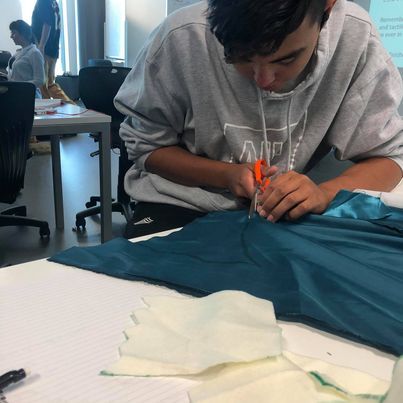
The flag project was very quick and smooth, I’m quite satisfied with the results even if it wasn’t the most comprehensive or complex work I’ve done.
Our group created a “flag” using fabrics, conductive thread some LEDs and a battery. With this project I immediately took the lead and got to managing the group. We went through everyone’s related skills then assigned tasks based on our strengths, weaknesses and confidence in certain skills. This got us to work VERY quickly and I’m super proud of how well we all coordinated together to get the work done efficiently.
With our focus on efficiency, we kind of sped right through most of the opening design selection and iteration. This meant we settled too quickly into designs and methods that weren’t actually the best for getting the work done in a quality way. With Jordan’s lead in the opening, we quickly settled on a design and got to work with the lettering, fabric selection and sewing for assembly of the electronic parts.
Our methods of getting things done were quite crude, and some decisions in our design were pretty baffling looking back. These are signs of a rushed planning process and are a clear example of something I can improve on in our next project. Within our group coordination it was all well and good, but designation of jobs is very different from the jobs being done, and while I had a reliable group to work with that will not always be the case and ensuring that people are motivated to get work done is an important part of management that I overlooked in our work process.
In my next project I’ll focus on having a comprehensive planning process to ensure that we get to work on something that is well thought out and can be looked back on with confidence that it was comprehensive and properly considered.
2 notes
·
View notes
Photo
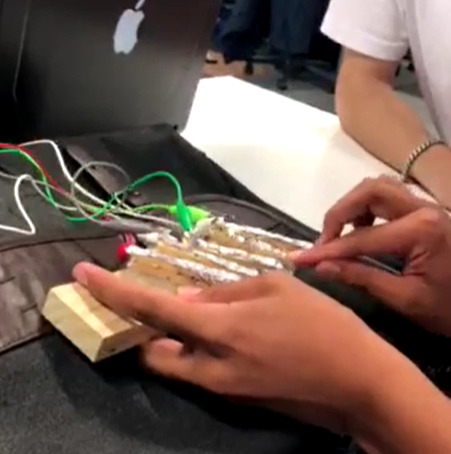
I’m generally not too thrilled or proud of our 2nd physical project. Our group created a basic instrument using recorded sounds, a MakeyMakey and Scratch. What we created was ingenious in its design, but also crude and not very creative. I did not take the initiative and work towards my goal set from the previous week and it showed.
Our instrument, nicknamed the “PiAGHno” because of the sound the instrument played was essentially a row of pegs with foil attached, creating a circuit off the connection between the peg foil based around a ground backplate.
The general physical design of the instrument was pretty interesting; however, it wasn’t much of a process. Our most useful member Jordan essentially made the whole thing himself. While this was good for cohesion in design, there wasn’t any iteration and improvement in the process. As a result of the lack of iteration the instrument had some glaring flaws that were essentially unsolvable because of how late in the design process the physical product was brought for us to make use of. The circuitry side of things was very well done on the plus side. Looking around at other instruments afterwards showed off that we were only 1 of 2 groups that had created universal grounds that attach to all of our keys to a single ground wire. This design made everything run much smoother, but the entire idea and execution is pretty much entirely the work of Jordan.
In total only 3 members of our group of 5 even did anything for this project, and of the 3 of us 1 person did about 60% of it. In my next project I’ll try and assign roles so that every member of the group works together, and design work should be iterated and done in a place where the rest of the group can provide perspective to improve design. While it’s great that people can carry more than their weight and work towards getting things done, that single focus creates its own problems such as blindness to certain flaws that can be very important in the general design of a product. If a product is going to be designed for the use of others, the perspectives of multiple people need to be applied to the work to ensure that it works for as many people as possible without feeling unnatural or improper for use.
2 notes
·
View notes
Photo
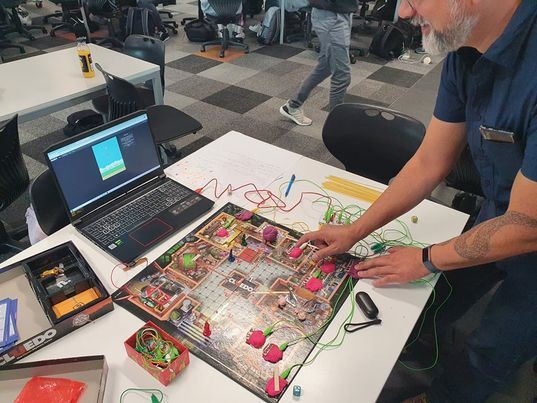
Our opening physical project was an absolute blast overall. Our group modified a board game using a MakeyMakey and small amounts of wiring paired with an LED and battery, then created a completely new set of rules to make a new game. What we created ended up being an intense, engaging, competitive and chaotic game where players scramble to complete it while dealing with the minigames and physical games in a race to the finish.
Our finished product worked very well. The iterative process we took of writing and creating, then testing, then reviewing and revising was incredibly good for refining our idea to be the best it can be. However in that same vein our initial ideas were absolutely horrible and not properly thought out, and we made quite a few important and pretty much unchangeable decisions right in the opening. As a result these decisions made it harder to rework into something good when we began to iterate.
Our final product turned out very well primarily because we relied heavily on the practical iterative approach. Because we applied this iterative approach so well our product improved significantly across iterations until it was easy to wrap your head around AND enjoyable as you started to gain momentum within the game. Taking honest feedback and observations seriously and without emotional attachment let us pull apart and reshape our game to something better.
It took us a while to realize that our initial ideas were bad, and before we realized we had already modified the board in an unchangeable way. This was mainly because we were in the opening stages and had not properly planned to put the iterative method into practice. In our second work session on Thursday we lacked proper group co-ordination and only 2 group members were actually working on the project over the duration. While there are some pros and cons to this overall I think having another person to test and provide a different perspective would’ve been more useful in pushing us past our initial flawed ideas and towards our inevitable complete overhaul that took us just over 3 hours to actually start doing.
If I were to try this project again, I’d focus more on co-ordination and ensuring that we know our ideas work before we start making the most important decisions and actions such as attaching or removing parts of the game board. In my next project I’ll try to focus on getting my group to show up at outside sessions and work to start iterating before acting on our initial ideas.
1 note
·
View note
Link
My Loopy Project.
I’ve decided to make a loopy system based off my personal experiences with Mental Health. This simplified system looks at the relationship between mood, work, entertainment and a very basic look at how people approach putting their time towards things.
A clear pattern I took notice of is the possibility for upward and downward spirals surrounding mood. Depending on how the system starts it can either result in a permanently maxed out stress and depression level or a maxed out everything BUT stress and depression. In my experience this reflects real life quite well as falling into depression may have taken a push but once I started to feel bad getting worse was incredibly easy and felt almost natural to progress further and further down. At the same time however starting to climb out of the pit I’d fallen into became significantly easier as I took notice of my mood and stress levels improving, and just like real life no matter where your mood is at as long as you are working hard stress is a natural part of that system.
This refreshing look at systems based thinking has given me a few good ideas of how to approach working on products in the future. The understanding that focusing on changing 1 thing is typically never going to ONLY make change in that 1 area. The knock-on effects of 1 element of a system will make potentially drastic changes to other elements that weren’t considered in design.
The most important lesson I can see from this little project is that you should always understand that the consequences of your work are never single-dimensional and approaching solving problems requires systematic thinking.
1 note
·
View note
